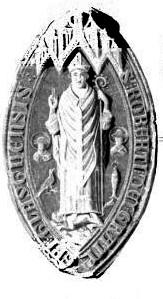Robert Wishart
| Robert Wishart | |
|---|---|
| Bishop of Glasgow | |
 |
|
| Church | Roman Catholic Church |
| See | Diocese of Glasgow |
| In office | 1271–1316 |
| Predecessor | William Wishart |
| Successor | Stephen de Dunnideer |
| Orders | |
| Consecration | 29 January 1273, at Aberdeen |
| Personal details | |
| Born | unknown unknown |
| Died | Probably 26 November 1316 |
| Previous post | Archdeacon of St Andrews & Archdeacon of Lothian |
Robert Wishart was Bishop of Glasgow during the Wars of Scottish Independence and a leading supporter of Sir William Wallace and Robert Bruce. For Wishart and many of his fellow churchmen the freedom of Scotland and the freedom of the Scottish church were one and the same thing. His support for the national cause was to be of crucial importance at some critical times.
Robert Wishart belongs to the Wisharts, or Wisehearts, of Pittarrow, Kincardineshire, a family of Norman-French origin. He was either the cousin or nephew of William Wishart, Bishop of St. Andrews, a former Chancellor of Scotland. Wishart's first recorded office in the church was as archdeacon of St. Andrews. He was appointed Bishop of Glasgow in 1273. As well as a churchman he became a prominent political figure during the reign of Alexander III. After the death of Alexander in 1286 Wishart was one of a panel of six Guardians, appointed to take charge of national affairs for the infant Margaret, Maid of Norway. Although he and his fellow Guardians signed the Treaty of Birgham, which envisaged the future marriage of Margaret to Prince Edward, the eldest son of Edward I, King of England, their agreement was subject to the caveat that the treaty would do nothing to threaten the integrity of the Kingdom of Scotland.
The early death of the Maid in 1290 left no generally recognised heir to the throne of Scotland. With the country threatening to descend into a dynastic war between the supporters of Robert Bruce, 5th Lord of Annandale, the grandfather of the future king, and John Balliol, Wishart was closely involved in all of the diplomatic negotiations with King Edward, invited to adjudicate between the rival claimants. When Edward insisted that he be recognised as Lord Paramount of Scotland prior to giving decision in the matter, Wishart pointed out that 'the kingdom of Scotland is not held in tribute or homage to anyone save God alone.' Edward simply sidestepped these objections; and with no means of settling the question by any internal process, he was duly accepted as Overlord by Guardians and Claimants alike.
...
Wikipedia
